The term “DOE” (depending on experience) is often seen in job postings. For employers, it opens doors to a broader talent pool, while for job seekers, it provides opportunities to negotiate compensation that reflects their expertise.
Here’s what "DOE" means in job postings and how it impacts both employers and job seekers.
What Is DOE in Job Postings?
When a job posting includes "DOE," it means that the employer has not set a fixed salary for the role. Instead, the compensation is determined based solely on the candidate's level of experience in the field.
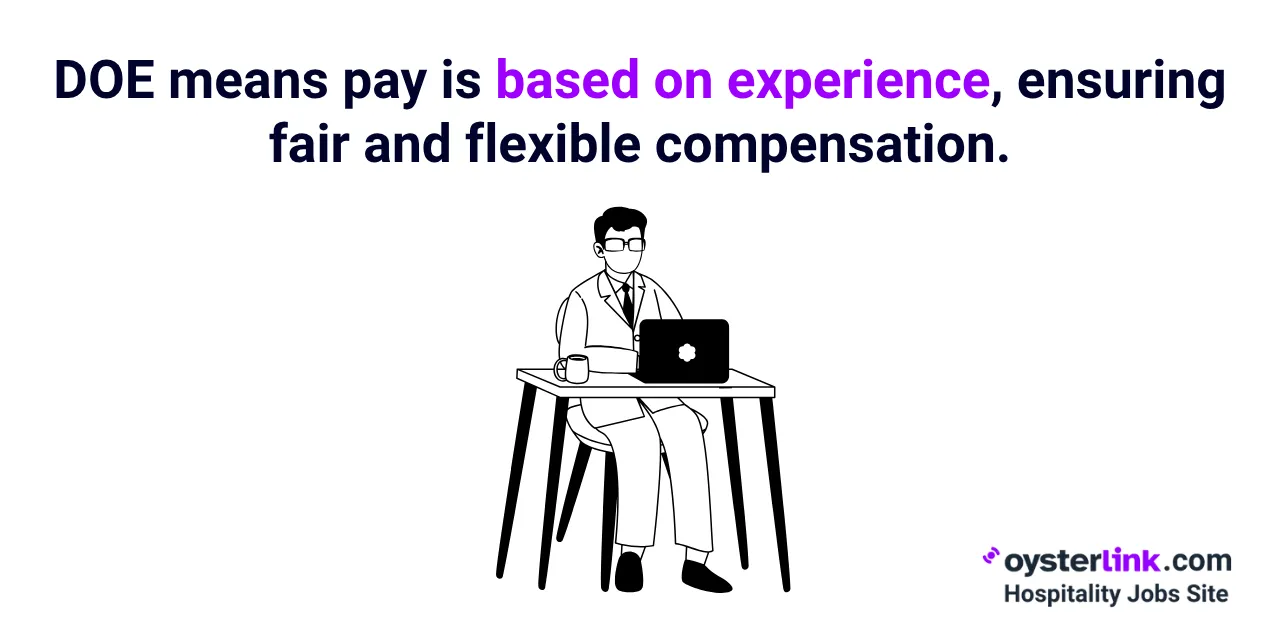
Ultimately, DOE in job postings highlights the value of experience-based compensation.
It ensures fairness in salary negotiations by aligning pay with a candidate's practical skills and industry knowledge, creating a flexible and mutually beneficial hiring arrangement for both employers and job seekers.
How Employers Determine Salaries With DOE
When employers use DOE in a job posting, they typically have a salary range in mind and determine the final offer by assessing factors such as:
- Years of relevant work experience
- Specific skills and expertise aligned with the job requirements
- Industry knowledge and understanding
- Past achievements and accomplishments
- Educational background and certifications
Employers may also consider the current market rates for similar positions and the candidate's salary expectations during the negotiation process.
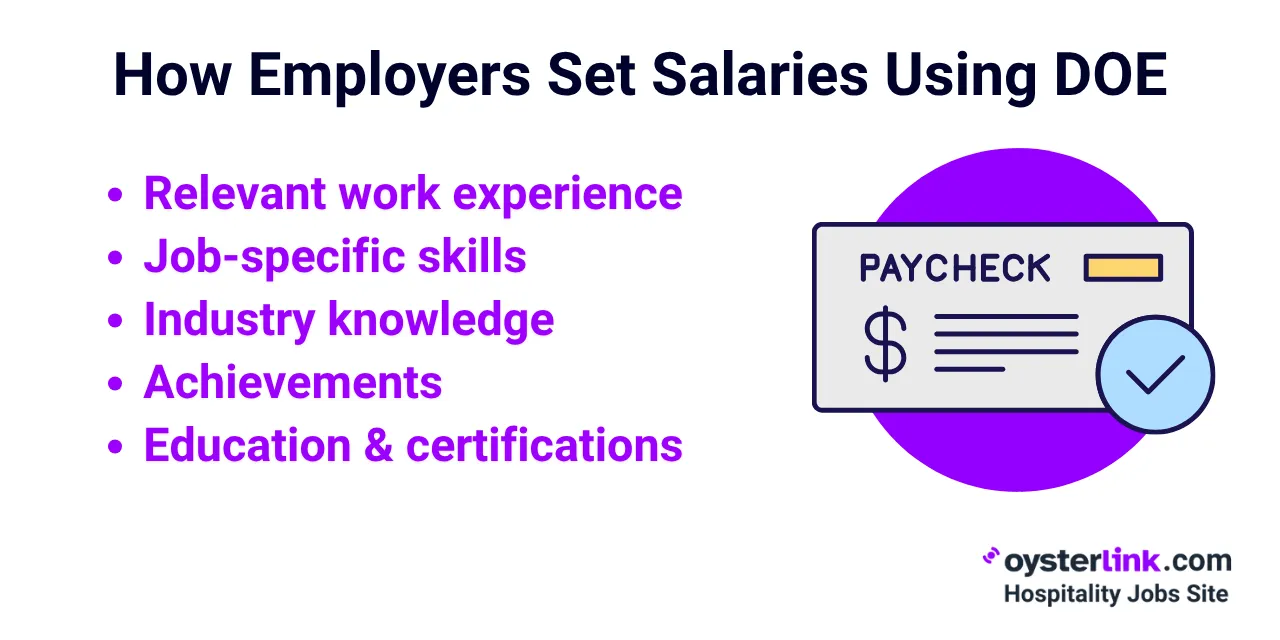
Benefits of DOE in Job Postings for Employers
Utilizing DOE in job postings offers several advantages for employers:
1. Attracting a wider talent pool
By not specifying a fixed salary, employers can appeal to candidates across various experience levels. This approach encourages applications from both seasoned professionals and promising newcomers, potentially leading to a more diverse and talented applicant pool.
2. Flexibility in hiring decisions
DOE allows employers to adjust their offers based on the specific qualifications of each candidate. This flexibility can be particularly beneficial when faced with exceptional candidates who may require higher compensation to secure their services.
3. Budget management
With a DOE approach, employers can better manage their payroll budgets by aligning salaries with the value each hire brings to the organization. This can result in more efficient resource allocation and potentially higher returns on investment in human capital.
4. Encouraging career growth
By tying compensation to experience, employers incentivize continuous learning and professional development among their staff. This can lead to a more skilled and motivated workforce over time.
Advantages of DOE in Job Postings for Job Seekers
Job seekers can also find several benefits in positions advertised with DOE:
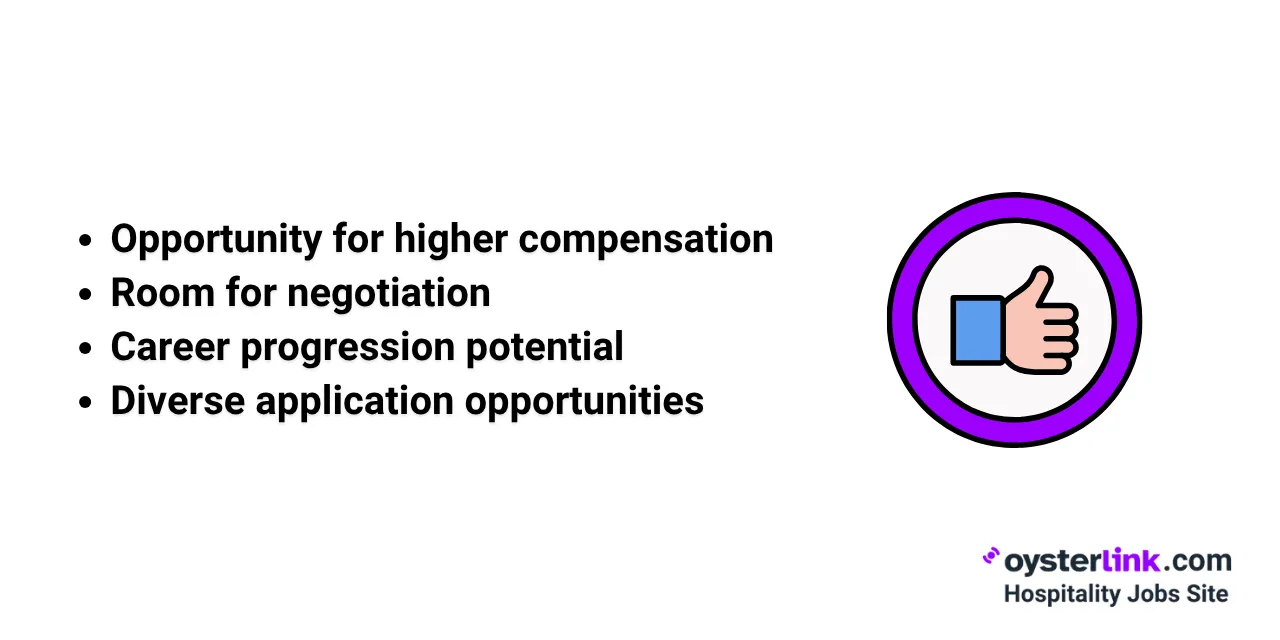
1. Opportunity for higher compensation
Experienced professionals can use their skills to negotiate higher salaries than fixed pay rates. This is particularly advantageous for those who have invested time and effort in developing specialized skills or industry knowledge.
2. Room for negotiation
DOE listings often indicate that there is flexibility in the salary offered, providing an opening for candidates to discuss their compensation expectations based on their qualifications and market value.
3. Career progression potential
For those early in their careers, DOE positions can offer a clear path for salary growth as they gain more experience and skills over time. This can be motivating and provide a roadmap for professional development.
4. Diverse application opportunities
DOE listings encourage applications from individuals with varying levels of experience, allowing candidates to apply for positions that might otherwise seem out of reach based on strict experience requirements.
Disadvantages of DOE in Job Postings
While DOE can offer benefits, it also comes with some potential downsides:
1. Lack of transparency
Some job seekers find DOE listings frustrating due to the lack of a clear salary range. This uncertainty can make it difficult to determine if a position aligns with their financial needs or career goals.
2. Competitive pressures
Employers who use DOE without including a salary range risk losing strong candidates to competitors who offer upfront transparency. In competitive markets, this can narrow the talent pool and slow down the hiring process.
3. Time-consuming process
For both employers and candidates, the process of determining an appropriate salary based on experience can be more time-consuming than working with a fixed rate. This may lead to prolonged negotiations and a slower hiring process.
4. Risk of undervaluation
Less experienced candidates or those who are not skilled in salary negotiation may find themselves at a disadvantage, potentially resulting in lower offers than they might receive with a set salary range.
5. Potential for inconsistency
Employers using DOE must ensure fair, consistent pay to avoid equity issues, especially under pay transparency laws requiring salary range disclosures. Lack of upfront clarity can create compliance challenges, so DOE practices should align with transparency rules to maintain trust and fairness.
6. Reduced visibility of job postings
Job seekers often prioritize scanning job postings for salary information when deciding which roles to consider. If a salary range is not provided, job seekers may overlook or skip the listing altogether, reducing the pool of potential candidates. This can be especially problematic in competitive job markets where transparency can help attract top talent.
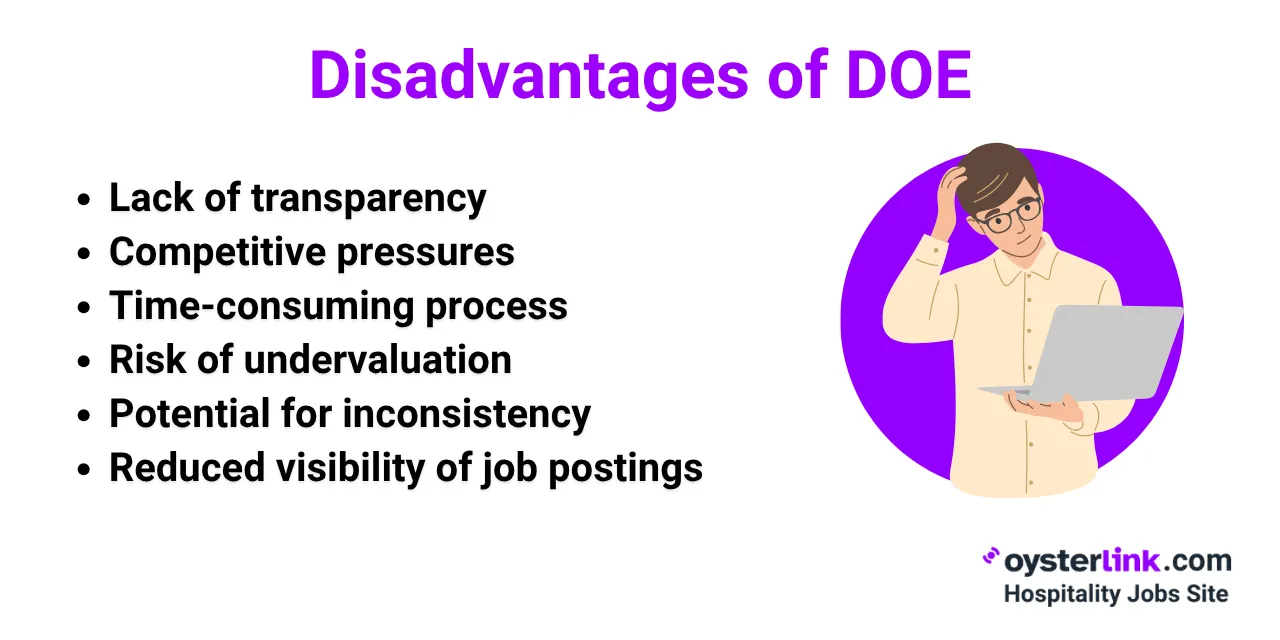
How To Approach DOE as a Job Seeker
If you're considering applying for a position with DOE listed in the job posting, here are some strategies to help you through the process:
1. Research industry standards
Before applying or entering negotiations, research salary ranges for similar positions in your industry and location. This information will provide a benchmark for your expectations and help you evaluate offers.
2. Highlight your experience
In your application and during interviews, emphasize the specific experiences, skills and achievements that make you valuable to the employer. This will strengthen your position when discussing compensation.
3. Prepared to discuss salary
Have a clear idea of your salary expectations based on your research and personal needs. Be ready to articulate why you believe you deserve a certain compensation level, using concrete examples from your work history.
4. Consider the total package
Remember that compensation isn't just about base salary. Consider other benefits such as health insurance, retirement plans, paid time off and professional development opportunities when evaluating an offer.
5. Don't be afraid to negotiate
If an initial offer doesn't meet your expectations, be prepared to negotiate respectfully. Present your case based on your qualifications and the value you can bring to the role.
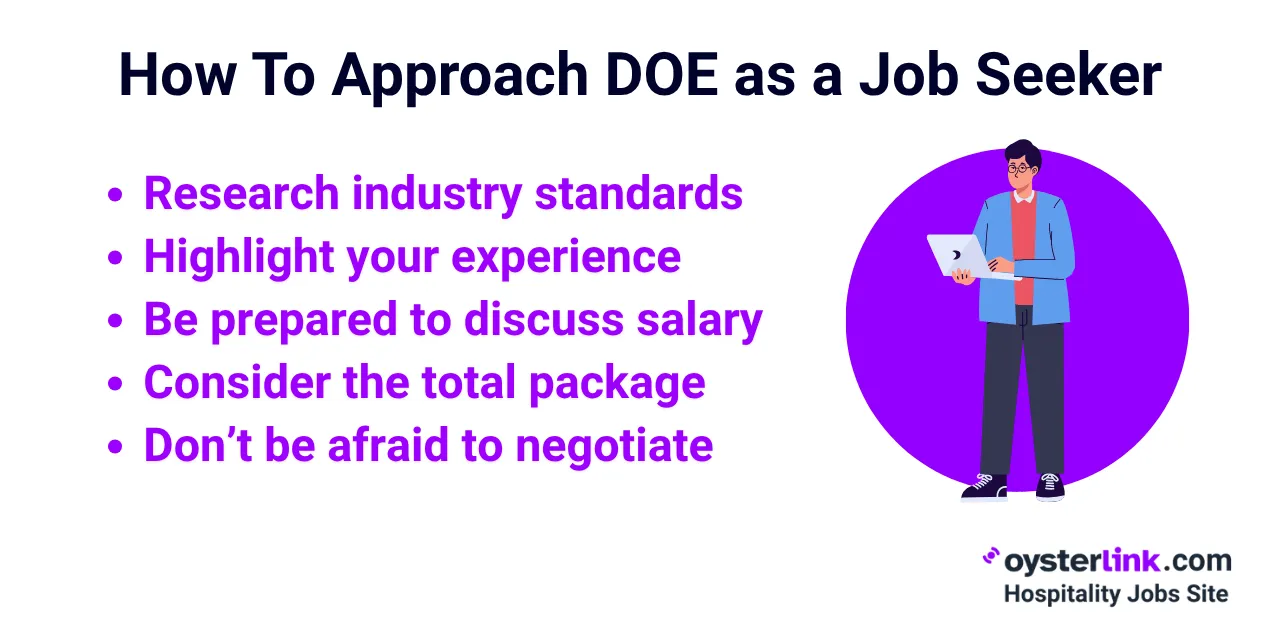
DOE vs. BOE: Understanding the Difference
When exploring job postings, you may encounter both DOE and BOE (based on experience).
While they may appear different, these terms are essentially interchangeable in most contexts. Both indicate that compensation will be adjusted based on the candidate’s experience, ensuring flexibility in salary decisions.
What Does BOE Mean in Job Postings?
BOE means that the employer will evaluate a candidate's salary based on their professional background. Like DOE, it emphasizes the role of experience in determining compensation.
Any additional factors, such as skills or certifications, may also be considered, but these are not exclusive to BOE.
DOE in Job Postings: Final Thoughts
DOE job postings offer flexibility for both employers and job seekers. For hiring teams, it allows room to match pay with a candidate’s qualifications while managing budgets. For applicants, it opens the door to salary negotiations based on merit and experience.
However, balancing this flexibility with transparency is essential — especially in today’s competitive and compliance-focused hiring environment. Whether you're posting a DOE job or applying to one, preparation and clear communication are key.
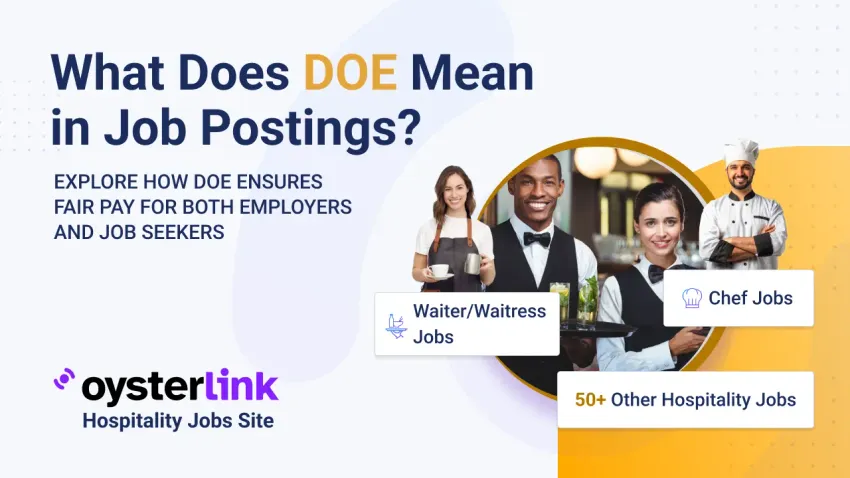









Loading comments...